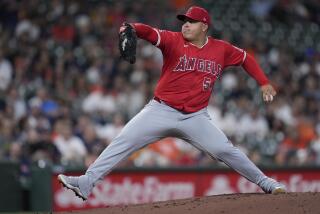Angels Can’t Handle Short-Handed Twins
- Share via
MINNEAPOLIS — Ballplayers Anonymous held a group meeting in the Metrodome on Thursday afternoon, and by the time its 3-hour 24-minute session was over, everyone walked away feeling good about himself.
The Minnesota Twins, without designated hitter Paul Molitor, left fielder Marty Cordova, catcher Terry Steinbach and shortstop Pat Meares, beat the Angels, 4-3, when a guy named Denny Hocking slapped a run-scoring single to left field off reliever Mike James in the bottom of the 10th inning.
Hocking, who had 219 major league at-bats before 1997 after spending most of the last three seasons at triple-A Salt Lake City, also sliced a two-run double down the left-field line against starter Dennis Springer in the fourth.
His game-winning hit followed Greg Myers’ walk and Roberto Kelly’s double, and scored rookie pinch-runner Chris Latham, who got his first major league hit in Wednesday’s 4-2 victory over the Angels.
A crowd of 11,646 in what has become the Metro-Doom for the Angels saw the Twins win for the eighth time in the last nine games against the Angels at home, outscoring them, 50-23, in those games.
“They’re the type of team that does all the little things well,” Angel shortstop Gary DiSarcina said. “We played good ball here, but it’s almost like it doesn’t matter who’s out there for them. They do the same thing.”
Right fielder Tim Salmon isn’t so sure.
“Yeah, you expect to win when you see those guys out of the lineup,” Salmon said. “We had opportunities to win both games and couldn’t get anything going. But that’s what happens when you have a big hole in your lineup . . . in our lineup.”
That big hole has basically swallowed the Angels’ cleanup batter, gulping down several scoring chances with him. Salmon went 0 for 5 Thursday, including a strikeout with runners on first and third and one out in the third, and he has three hits in his last 36 at-bats (.083).
“I’m not going to lie to you and say I’m not pressing,” said Salmon, batting .154 since signing a four-year, $22.5-million contract extension this spring. “You hate this. I mean, 0 for 5? How many times have I done that?
“Shoot, I could have hit the winning run in when we had guys on first and third--all I needed was a sacrifice fly or a ground ball--that’s what kills me, to have an opportunity like that pass me by. If you ever find a player who can tell me how to get out of this, let me know.”
Salmon tried something different Thursday. After being called out by umpire Drew Coble on a pitch that appeared to be six inches outside, Salmon swung at the first pitch in his next three at-bats, all flyouts.
“I didn’t mind that--I want him to be aggressive,” Manager Terry Collins said. “If he falls behind on the count, he ends up being less aggressive.”
Salmon said at this point, he simply can’t afford to let good pitches go by without swinging.
“That’s not my norm to go up there hacking, not working the count, but I can’t take the chance of giving away good pitches to hit,” he said. “And when they get pitches off the plate [called strikes], it makes it that much tougher.”
Salmon believes good hitting boils down to two simple things--seeing the ball well and swinging the bat well.
“You have to quit analyzing it--you just have to no-brain it,” Salmon said. “You have to stop worrying about counts and location, and just see the ball and whack it.”
The Angels again got good pitching, with Springer giving up three runs and six hits in 5 2/3 innings and Chuck McElroy adding 2 1/3 innings of one-hit, scoreless relief.
They got a huge break when Twin second baseman Chuck Knoblauch dropped DiSarcina’s sixth-inning popup, which led to two unearned runs.
But Darin Erstad was cut down at the plate trying to score on Jorge Fabregas’ grounder to first with runners on first and third and one out in the second, and Salmon missed his RBI chance in the third.
“We’re just not getting it done in RBI situations where you don’t need a hit, where a sacrifice fly or a ground ball might score a run,” Collins said. “Situational hitting is what we need.”
More to Read
Go beyond the scoreboard
Get the latest on L.A.'s teams in the daily Sports Report newsletter.
You may occasionally receive promotional content from the Los Angeles Times.







